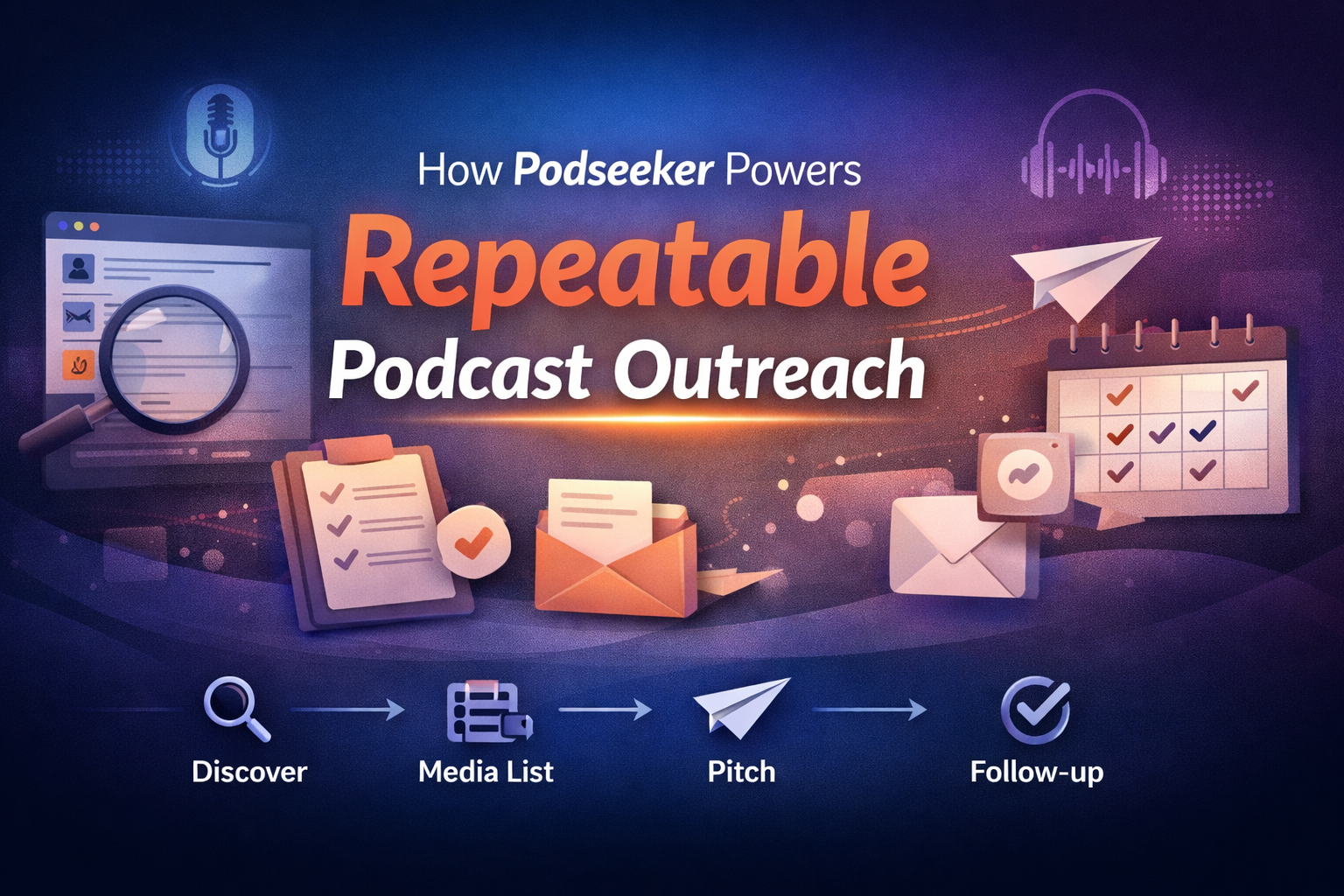Alright, so you've gotten good at pitching guests. You know how to find a show, write a decent email, and get your client booked. That's a solid win. But what's the next level?
The real magic in podcast PR often happens when you move beyond the one-off guest appearance and start building genuine, creative partnerships. This is where you can generate massive value for a client and build lasting relationships with hosts. But most PR pros stop at the standard guest pitch because they're not sure what else to propose.
This guide will walk you through five types of podcast partnerships you can propose that go beyond the basic pitch, and how to approach a host with these bigger ideas.
First, Find a True Partner, Not Just a Podcast
Before you think about proposing a deeper partnership, you need to be absolutely sure you've found the right show. A multi-episode series or a co-hosted webinar requires much more alignment than a single guest spot.
This means you have to go deep in your research. A quick look at their title and category isn't enough. You need to understand:
- Their Content History: Have they ever done collaborations before? What topics do they return to again and again?
- Their Audience Engagement: Do they have a strong social following or an active community? This is crucial for collaborative promotion.
- Their Host's Authority: Is the host a respected voice in their niche?
The Podseeker Shortcut: This is where a professional podcast database is non-negotiable. Use our podcast search to filter shows not just by topic, but by audience size and social reach. Dig into their profile on Podseeker to see recent topics and guest history to confirm they're a perfect strategic fit before you even think about outreach.
5 Podcast Partnership Ideas Beyond a Standard Guest Pitch
Once you've identified a great potential partner, here are some ideas you can propose that are more strategic than a single interview.
- A Multi-Episode "Expert in Residence" Series
- The Idea: Instead of one interview, propose a short series of 3-5 segments where your client comes on as the go-to expert for a specific topic. This could be a 10-minute segment at the beginning of each episode for a month.
- Why it Works: It positions your client as a deep authority, not just another guest. It provides the host with consistent, high-quality content for a month, which is a huge value-add for them.
- A "Content Swap" or "Feed Drop"
- The Idea: If your client also has a podcast, propose a content swap. You feature one of their best episodes on your client's feed, and they feature one of your client's best episodes on theirs.
- Why it Works: It's a direct, mutually beneficial audience-sharing strategy. Both shows get exposed to a new, highly relevant audience with minimal new content creation required.
- A Co-Hosted Webinar or Live Event
- The Idea: Propose co-hosting a live webinar, a LinkedIn Live, or an online Q&A session on a topic relevant to both your client and the podcast's audience.
- Why it Works: It creates a new piece of high-value content (the recording) that both of you can use. It combines your marketing lists and social reach for a bigger promotional impact than either of you could achieve alone.
- A Brand Ambassadorship or Product Integration
- The Idea: If your client has a product or service that the podcast host would genuinely love, you can propose a deeper brand ambassadorship. This goes beyond a simple ad read and involves the host using and talking about the product authentically over time.
- Why it Works: This is how you get the kind of deep, trusted endorsements that really drive results, similar to the famous Huberman Lab partnerships. It requires perfect alignment but has a massive potential ROI.
- A Joint Research Report or Co-Branded Study
- The Idea: Propose collaborating on a piece of original research, like a survey or data analysis, relevant to your shared audience. You can then co-author a report or a whitepaper.
- Why it Works: Creates an authoritative, link-worthy asset that both brands can use for lead generation and PR for months to come. You can announce the findings in a special podcast episode.
How to Propose the Partnership (The Initial Email)
Your proposal email for a bigger partnership needs to be even more thoughtful than a standard guest pitch.
- Acknowledge Your Intent: Be clear upfront. "Hi [Host Name], my name is [Your Name]. I'm reaching out with an idea for a potential partnership that goes a bit beyond a standard guest pitch."
- Show You've Done Your Homework: Briefly mention why you believe their show is the perfect fit for a deeper collaboration. Reference their audience, their content themes, and their values.
- Present a Clear, Simple Idea: Briefly outline one of the partnership ideas above. Don't overwhelm them with five different options. Pick the one that makes the most sense.
- Focus on Mutual Benefit: Frame it around the value you can create together. How will this benefit their audience and their show?
- End with a Low-Friction Call to Action: Don't ask them to commit immediately. End with something simple like, "If you're open to exploring creative collaborations, I'd love to chat for 15 minutes to flesh out this idea. Let me know what you think."
The goal of the first email is to start a conversation, not to close a deal.
Wrapping It Up
Moving beyond the standard guest pitch is how you graduate from simple media placements to creating real, strategic partnerships. By identifying the right podcast partners and proposing creative, mutually beneficial collaborations, you can create massive value for your clients and build lasting relationships in the industry.
Of course, it all starts with finding those perfect partners.
Try us risk free with a FREE 7 days trial.








